It is no mystery why so many fantasy authors resort to high-stakes conflicts. Nothing engages the reader quite like having the entire world at stake. For proof, consider how very well The Lord of the Rings has sold for so very long, not to mention the popularity of the legions of blatant knock-offs works inspired by The Lord of the Rings.
And yet, offering nothing but world-saving is a bit like offering nothing but 100-decibel high notes. Eventually one becomes numb to what should be thrilling. Also, high stakes series raise legitimate questions about the Big Bad’s competence. If Evil launches seven different apocalypses, all of which are foiled by the same small group of high school- and college-age teens, one has to wonder if maybe Evil should consider pursuing opportunities in a different field.
Fortunately, it is perfectly possible to write works and series in which the stakes, while important to the protagonist(s), are merely personal. Regardless of what happens in the stories, the world will tick on. As long as the outcome matters to the protagonists, it will matter to the reader. Consider these five works.
Legends & Lattes by Travis Baldree (2022)
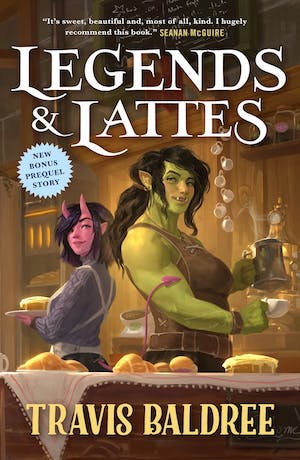
Tiring of playing meat-shield for adventuring parties delving into hazardous dungeons, Viv invests her future in One Last Job. Contrary to One Last Job conventions, not only is Viv’s One Last Job a success, it truly is the orc barbarian’s last job, at least in the field of adventuring. A new life awaits! In food services.
Viv has an entrepreneurial vision: she will make and sell coffee, which people will then buy. Can someone used to hacking her way past impediments deal with logistical and marketing challenges? Or is launching a novel endeavor in an untested market without the applicable skills doomed to failure?
Many book covers lie. In this case, Baldree’s cover promises an orc and a succubus selling coffee and pastries and the novel delivers an orc and a succubus selling coffee and pastries. Likewise, the tagline, “A Novel of High Fantasy and Low Stakes,” is accurate. No Dread Lords to be found here. In fact, the book is so obviously an example of the sort of thing I am discussing that I am mentioning it first, purely to avoid having twenty people mention it in the comments.
RuriDragon by Masaoki Shindo (2022– onward)

Schoolgirl Ruri is nonplussed to discover that she has sprouted two razor-sharp horns in her sleep. Ruri’s mother provides a perfectly reasonable explanation. Ruri is half dragon, and the horns are a manifestation of her father’s lineage. At school, Ruri discovers that she has inherited a second draconic trait. Happily, the student on whom Ruri breathes fire is not seriously injured1.
Ruri may be the first human-dragon hybrid. Just how her two heritages will manifest is a mystery2. However, no matter how extraordinary Ruri is, she’s still a high school student, expected to juggle academia and her personal life on her way to adulthood.
One of the remarkable aspects of this amiable manga is how nonchalantly Ruri’s schoolmates (even the one she set on fire) react to the revelation Ruri isn’t fully human. It makes one wonder what else is going on in their lives that a half-dragon chum gets a “Oh, that’s kind of cool, I guess,” reaction.
Kiki’s Delivery Service by Eiko Kadono (1985)
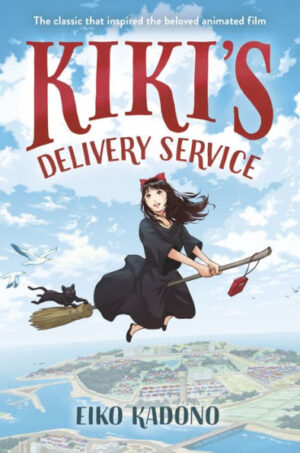
Half-human, half-witch, Kiki chose to embrace her witchy mother’s heritage. At age thirteen, Kiki faces the rite of passage all thirteen-year-old witches endure: Kiki must leave her family behind and make a new life in some unfamiliar community.
Were this not sufficient challenge, Kiki is lacking in the magical powers department. Kiki has mastered a single arcane ability: flying a broom. How to parlay this knack into something that will endear Kiki to her new community is unclear. Kiki is determined to prevail.
Something that was left out of the Studio Ghibli anime adaptation of this manga: the parlous state of witchcraft in the modern world. Lacking any sort of formal system to preserve and pass on witchcraft, each generation knows less than the one before. It’s probably for the best that the manga’s focus is on one witch who does very well for herself and not on witches in general, who probably should be placed on the endangered list.
Cyrion by Tanith Lee (1982)
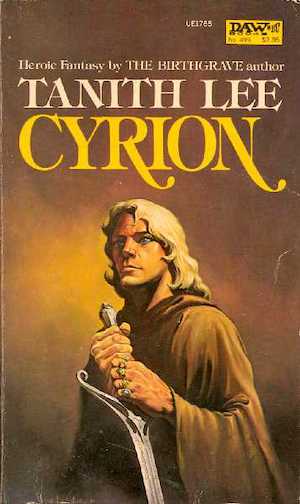
Cyrion’s world is full of magic and wonders. Cyrion’s world is also full of greed and scheming. Life in a world of conniving sorcerers, devious conspirators, and a surprising abundance of cursed items is never boring; it is, however, often short.
Enter Cyrion, who in another world might have called himself a consulting detective. Brilliant Cyrion wields an impressive array of skills, from deduction to disguise to rapid improvisation. As these eight stories demonstrate, it is always a mistake to underestimate Cyrion… but so many do.
Cyrion is one part Sherlock Holmes (minus Watson) to one part Batman (minus Robin). Like both characters, Cyrion is famous, so it’s weird how many villains have plans that boil down to “Outthink the guy whose schtick is that he is always, always, always the smartest man in the room.” Hope springs eternal3.
Swords and Deviltry by Fritz Leiber (collection 1970)
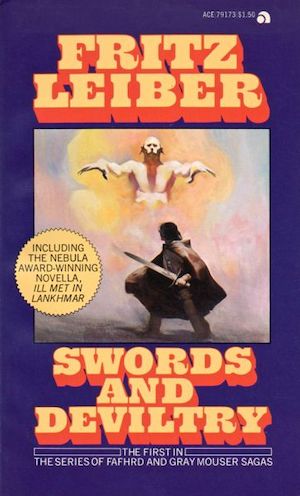
Fafhrd is a skilled barbarian from the frigid north. The Gray Mouser is a talented thief and duelist, with a smattering of magical arts. Neither giant Northman nor crafty Southerner is on a first-name basis with ethics or prudence4. Perfect adventurers for decadent Nehwon.
Swords recounts a few early incidents in the two adventurers’ lives, as they make what were in retrospect terrible decisions, and then, however implausibly, survive them. It’s good to be series protagonists, especially in stories set early in their careers5.
Swords and Deviltry is a sword and sorcery work. That genre usually features fairly low stakes (at least compared to The Lord of the Rings). At one point S&S seemed to be the dominant mode for American fantasy—so I was surprised to discover how recently S&S got its name. Of late, S&S seems to be enjoying a resurgence, which I applaud.
These are but five examples of low-stakes fantasy. No doubt many of you are fond of works that I have unjustly ignored6, works whose absence makes you question the very foundations of Western civilization. Feel free to mention your faves in comments below.
- Generally speaking, supernatural abilities come packaged with secondary characteristics needed to survive having those specific abilities. As Ruri discovers immediately after breathing fire, her mouth and lungs aren’t fireproof, at least not immediately. She does, however, have a prodigious healing ability, enough to keep her alive while she is toughening up. It makes one wonder if Ruri is really the first human-dragon hybrid, or just the first one to survive.
- There are in fact many mysteries about Ruri, not least of which is “how could a normal human female and a bus-sized dragon manage to have procreative sex?” The manga studiously declines to answer, although I imagine “very carefully” probably played a role.
- Perhaps the malefactors’ confidence is bolstered by the knowledge that Cyrion, like Holmes, died once. They should further consider the fact that Cyrion, like Holmes, got better.
- In the pair’s defense, even had they tried to be cautious, fate (also known as Fritz Leiber, Jr.) would have steered them towards adventure. To that end, Leiber provided Fafhrd and the Gray Mouser with advisors Ningauble of the Seven Eyes and Sheelba of the Eyeless Face, both of whom are avid plot instigators.
- Alas, the pair’s loved ones do not share the same immunity. Fridging may have been named in 1999, but it is an ancient narrative convention that long predates its formal recognition.
- If any of your examples are the five I mentioned above, you might get a hard (virtual) stare. If it is Legends & Lattes, I might yell in frustration. In all caps.










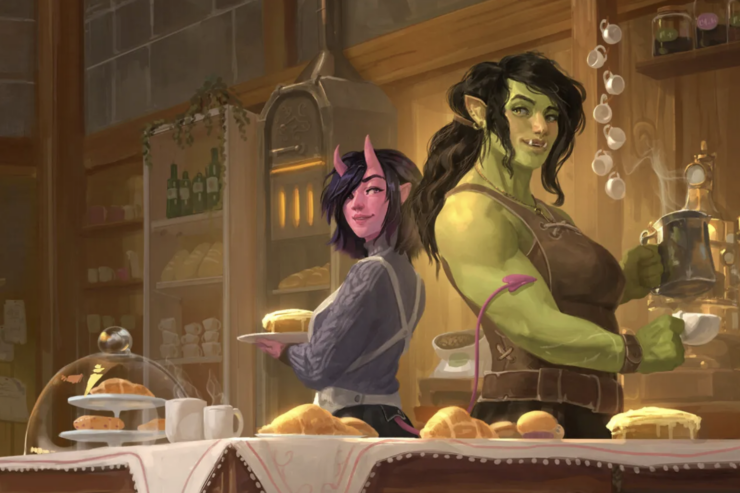
I remain a fan of the comedy of manners that is Alexei Panshin’s Villiers novels. They are as low stakes as they come, as a remittance man Villiers wants for nothing, and the humour is in the culture and language. It’s no wonder Walter Jon Williams’ wrote what is as much Villiers fanfic as anything in his Drake Majistraal trilogy, which do have slightly (but not much) higher stakes as Majistraal’s avocation as an Allowed burglar does have some risks…
Well, that’s a reason to try the Williams.
Agree to both of these – Villiers was a lot of fun, ditto the Majistraal books, I really wish that there were more books in both series.
Quite a few of Lawrence Watt-Evans’ stories fit this mold. While Ethshar certainly has its share of epics, plenty of the stories are much smaller scale.
Purely for its fun entertainment value, the first example that popped into my mind was Harry Harrison’s The Technicolor Time Machine which revolves around a crappy film studio just trying to make a film that’ll sell. Hilarity ensues. How this novel has not been adapted into a film itself remains beyond me.
There is a BBC Radio adaptation.
Clarke’s Songs of Distant Earth is surprisingly low-key for a novel with the total destruction of Earth as a background event. Mostly it is about a romantic triangle with a built-in expiry date: one of the participants is a visitor who will be soon heading off to the stars, never to return.
Yeah, I recently borrowed a copy from one of those little curbside library boxes so I could reread it, and I was reminded why I sold my original copy to begin with. There’s not a lot of story in it, mainly just worldbuilding. It’s surprising that it was originally a movie treatment; you’d think it would’ve been more eventful then. But maybe that’s why nobody bought the movie treatment.
I had no idea it was a movie treatment.
After doing a bit more checking, I find that “The Songs of Distant Earth” was originally a short story in 1958, published in The Other Side of the Sky. According to the Internet Speculative Fiction Database, the movie treatment was developed for Kubrick, and when it didn’t go over, it was published in Omni in 1981 — and I remember reading it there.
Interestingly, Legends & Lattes‘ prequel (Bookshops & Bonedust) doesn’t fit this category nearly so well, despite the fact that as in Swords and Deviltry, the simple fact that’s a prequel tells you that our protagonist’s life isn’t really on the table. We’re now much earlier in Viv’s career, with the One Last Job far in the future and the particular job she’s dealing with now has reasonably high stakes. I think this works well for it, though I’ve heard from folks who disagree.
It does make sense that it wouldn’t be quite so low-stakes, as Viv is at a different point in her life here, still walking up the hill, to borrow the metaphor they use in the book, where Viv in Legends & Lattes has come back down from the hill.
James Palmer has complained on Twitter that both of these books are about running small businesses that everyone thinks of as cozy and charming, but are very stressful and demanding in real life.
Stressful and demanding are relative terms; Viv has just spent 20 years as basically a mercenary special forces trooper, compared to which running a coffeeshop is a walk in the park in terms of both stress and injury potential, especially a very limited operation like hers. There’s no knifework, no hot oil, very few hot surfaces, a strictly limited menu that’s 90% handled by someone else.
I can’t answer for the bookstore, I’ve never worked in one of those.
Unnatural Magic , which I mentioned in my comment, has a very similar feel here; like Bookshops, there’s something fairly significant going on, but a lot of it is going on offscreen while the protagonists live their lives and have feelings at each other. The big issues getting dealt with is the B plot, as it were, instead of the epic fantasy formula of world-shaking events being the foreground and the slice-of-life part showing up occasionally to relieve the tension or show the happily ever after when the Big Bad has been defeated.
A Ruthless Lady’s Guide to Wizardryis mostly about a young firewitch trying to pay the rent and maybe also get a roof over her mother’s head (setting things on fire being a difficult power to monetize). She lucks into a job escorting an heiress to her wedding as part of an honor guard, which sounds like a paid holiday as long as she can keep from offending the toffs, especially that gorgeous troll girl who’s on the job with her.
Then the necromantic construct attacks…
In many books, this is where things would get epic and Dark Lords might be mentioned, but this is a quiet, peaceful sort of world that hardly even has wars anymore, so this is all a sordid little matter of money and addiction.
(This is a loose sequel to Unnatural Magic, which feels very cozy, but the plotline is also about matters of national/international importance; someone’s been killing trolls and stealing their organs, which led to some trolls massacring a human community, which led to soldiers being sent there. The survivor of that detachment is taken in by a troll who isn’t involved and they team up to investigate and maybe prevent war or massive civil unrest. Also a young woman from a rural backwater is determined to go to university to study magic. This becomes relevant later. Despite the larger implications, it’s mostly about relationships, familial, romantic, and otherwise, and will almost certainly appeal to fans of Travis Baldree)
I reread the Justice, Inc adventure The Sky Walker a while back and was a bit amused to discover the Big Bad’s goal for atrocities that seem to be an Attack on America Itself!, is in fact just a local real estate scheme not terribly distant from any given Scooby-Doo plot.
Three-Body Problem, which takes on the survival of the human race (for longer than the half-million years it’s already had). And clarifies at the end that this wasn’t such a big deal…in the really grand scheme of things. I trust that was enigmatic enough to not count as a spoiler. I mean, now you have to read it, right?
Ursula Vernon (Writing as T Kingfisher) gives us Swordheart, the events of which, although hugely important to the protagonists, hardly raise ripples in the larger world it is set in. The other books in the continuity (Clocktaur Wars, Saint of Steel) are of slightly wider scope in the ‘imperil much of the known world’ sense.
Pick a Jack Vance book…
IIRC an entire planet is at risk in the Cadwal Chronicles – Araminta Station, Ecce & Old Earth, Throy. A mostly uninhabited planet. The heroes want to keep it a wilderness preserve while the villains want to open it up for development. While there is the potential for murder it’s still very different from the typical space opera.
When I read the blurbs for the countless self-published books sold by Amazon I want to tell these writers that if the life of the protagonist being at risk is not enough to make a book interesting then the fix is better writing not bigger outcomes.
But pick carefully. The Demon Princes cycle, some of the Alastor Cluster books, and the tales of Cugel the allegedly Clever are purely personal; others, such as Emphyrio, The Blue World, or several of the shorter stories in Eight Fantasms and Magics, end with tyrannies overthrown
How should we classify The Dragon Masters? All the action takes place in a few isolated valleys, in a remote world in a forgotten part of the galaxy. On the other hand, the future of humanity may or may not be a stake…
If I recall correctly, some of the Demon Princes were rulilng worlds, or large parts thereof, when wossface, Kerth Gersten or something like that, offed them. Also, they were major planet raiders when they were together. So though his revenge was more or less personal, there were still significant stakes there, I would say.
Lois McMaster Bujold’s Five Gods novels have relatively high stakes, but some of the Penric & Desdemona stories are fairly low-stakes.
Dave Duncan’s work mostly runs to high-stakes stories but A Rose-Red City is an exception.
Steven Brust’s The Sun, the Moon, and the Stars is not precisely SFF but it’s adjacent, and is all about the protagonist working on a painting, and what kind of things his studiomates are painting, and whether they can manage to put on an art show. (Jo Walton discussed it this site many years ago: https://reactormag.com/art-and-life-and-fairy-tales-steven-brusts-lemgthe-sun-the-moon-and-the-starslemg/)
I’d say the low-stakes Penric novels are some of the most affecting. What’s more important than one person’s life, after all? (In that universe, the gods would say: nothing.)
Delany’s (Trouble on) Triton has relatively low stakes — it’s about one person unable to find happiness because they’re a schmuck — but takes place against the very high-stakes background of a war between the “Inner Planets” (Earth and Mars) and the Outer Moons, in which Earth gets its ass handed to it.
Many of James Branch Cabell’s novels are very low-stakes. The best-known, Jurgen, is basically the story of a middle-aged pawnbroker’s wanderjahr with a lot of fantastic elements.
David Gerrold’s The Man who Fondle — sorry, Folded Himself is pretty low-stakes, as is the somewhat similar “The Men Who Murdered Mohammed,” by Alfred E. Bester. (In fact, a lot of Bester’s short work is pretty low-stakes. But not all.)
As are many of Asimov’s original “positronic robot” stories; the stakes are usually no higher than “figuring out why the robot is acting in this wacky way,” though a couple go rather higher.
ISTM that the players in Swordspoint and The Privilege of the Sword may change positions in the dance, but the dance will largely go on. This may be less true of The Fall of Kings, but it has been too long since I read it.
And then there’s Ecotopia, which is largely a tour of the new country; there are hints that unseen players are acting behind the scenes, but the only change is personal.
There’s Becky Chambers’ A Psalm for the Wild-Built. Low stakes and an amazingly nice world.
I think Fafhrd and the Gray Mouser at least dated Ethics and Prudence- probably at the same time.
Questionable Content has pretty much set the bar for low-stakes content – most of the characters are pretty much slackers or work in service industries like a coffee shop and robot repair. I’ve sometimes wondered what’s going on in the background that we’re not being told – three (I think) of the human characters have prosthetic limbs and nobody ever seems to think there’s anything odd about it, and the robot characters include Bubbles, a retired milspec combat droid.
last place I ever expected to see a QC ref.
To Hive and to Hold by Amy Crook is a low-stakes, low angst fantasy. Magic came to our world in a disruptive way in the not-too-distant past, but some elements of tech remain in use. An apothecarist with a hive of magical bees on his roof has a low-key romance with his new neighbor, a magical tattooist. The fun is in seeing the different cultural communities, magical and nonmagical, that the characters trade with to get what they need to expand the beehive.
I immediately thought of Ellen Kushner’s Swordspoint when I saw this post. The stakes in the book are largely very interpersonal and localized politics.
Some other thoughts:
Kazuo Ishiguro’s Klara and the Sun
Ryka Aoki’s Light from Other Stars
Peter S. Beagle’s Summerlong
Erin Morgenstern’s The Night Circus
In Caroline Stevermer’s Magic Below Stairs, the stakes for the orphan Frederick are his relationship with the brownie Billy Bly. He isn’t even in danger of losing his job, valeting for a Sorcerer.
A College of Magics by the same author has stakes that amount to graduating university.
Say what? That may be the stakes at the beginning, but at the end the lead has to seal a rift into chaos that could eat a large part of ~eastern-Europe.
Jo Walton’s Or What You Will is relatively low-stakes; an author writing her next book. Of course, for the voice in her head, the stakes are a little higher. Regardless, they both spend a lot of time in Florence, Italy, eating delicious food and admiring art.
The Wind in the Willows
Another Leiber: Conjure Wife, which perfectly exemplifies the old axiom about politics in academia.
Googling on that, I see it attributed to Laurence Peter and also to Henry Kissinger.
Good recs. Very glad to see Cyrion and Fafhrd & the Gray Mouser mentioned.
It’s an attribute of sword & sorcery that it is low-stakes/the opposite of epic fantasy.
In that vein, I’d like to recommend the S&S/low fantasy novel Frostflower and Thorn by Phyllis Ann Karr. A swordswoman and sorceron (sorceress) join forces to survive in a small, subtly post-apocalyptic kingdom. (CN/TW: rape, handled in ways that haven’t aged all that well.)
The sequel is Frostflower and Windbourne, and there are some short stories (apparently uncollected), but it’s been so long since I’ve read them, I may not correctly remember whether they’re also low stakes.
Penric & Desdemona series by Lois McMaster Bujold. Excellent fantasy series of mostly novellas where the political is definitely personal, the magical system is detailed, complex, & consistent, the values are anchored in kindness, and the world–while often dangerous–is not hovering on the brink of disaster.
I don’t know whether this is truly low stakes sff or only in the context of the author’ s larger body of work, but I feel like Zelazny’s Doorways in the Sand might fit these criteria. It’s been a loooong time since the last time I read it, but I don’t recall the galactic politicking being apocalyptic as much as diplomatic puzzle solving. Also, it was pretty hilarious.
It’s mostly treated lightly — the narrator is definitely a flaneur — but in the end the plot driver turns out to be quite serious.
Sarah Rees Brennan’s In Other Lands has a boy going off to a magical school in an alternate world. (he cuts the explanation short, explaining that it’s not exactly a strange idea. While there are wars, the book is mostly concerned with his attempts to get laid.
Randall Garrett’s Lord Darcy mysteries? If I remember, a royal investigator with a forensic wizard for a partner. Haven’t read them for better than 40 years, but as I remember, no higher stakes than most of Sherlock’s. (Or Solar Pons, if you want to be obscure).
Or the more recent Honor Raconteur’s similar series of mysteries about a Fed pulled into a fantasy world by a rogue witch, ending up working with, well, a forensic wizard…
Many of them are simply murders with no larger implications, but “A Case of Identity”, “The Ipswitch Phial,” and “A Spell of War” all involve major issues of national security
As does the novel, Too Many Magicians.
Speaking of Viv the Barbarian-turned-Barista, Baldree recently released a prequel novel, Bookshops & Bonedust, which has Viv, at the start of her adventuring career, helping out at a bookshop while recovering from an injury. It’s really good.
IIRC, Tanith Lee mentioned long ago that Cyrion owed no little inspiration to Dunnett’s Lymond, though I cannot find reference to this at the moment.
Another low stakes fantasy manga: Natsume’s Book of Friends.
Low stakes fantasy novels: several of Sharon Shinn’s works like The Shape-Changer’s Wife, Summers at Castle Auburn, and The Safe-Keeper’s Secret series.